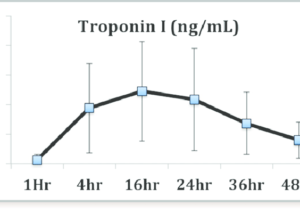Can enough atrial fibrillation episodes, over time in someone with heart disease, cause cardiac damage that’s equal to a heart attack?
“Generally, A-fib does not result in significant heart damage,” says Dr. Simon Dixon, chairman of cardiovascular medicine for Beaumont Health System in Michigan.
You may already know that the higher the troponin level, the more damage that’s been done to the heart. The higher the troponin elevation, the worse the long-term prognosis is.
Over a certain level means a heart attack. Under that cut-off point, the result is deemed “indeterminate” or a “grey area.”
I wondered if a lot of “indeterminate” elevations of troponin, from atrial fibrillation in a patient with heart disease, would, over time, “equal” a heart attack.
So for example, suppose the elevations range from 0.11 to 0.30 – many of these over an extended period of time from episodes of A-fib that occur between sporadically and frequently.
Wouldn’t eventually all of these fractions “add up” to a heart attack?
Dr. Dixon explains, “Some patients have chronic low levels of troponin elevation (for example, 0.14 ng/mL).
“This can be ‘normal’ in some patients, or associated with disorders such as heart failure and kidney failure.
“This level of troponin elevation does not necessarily cause the same level of damage as a heart attack.”

Dr. Dixon specializes in the treatment of acute and chronic coronary artery disease, with research focusing on pioneering treatments to save heart muscle in patients having heart attacks.
 Lorra Garrick has been covering medical, fitness and cybersecurity topics for many years, having written thousands of articles for print magazines and websites, including as a ghostwriter. She’s also a former ACE-certified personal trainer.
Lorra Garrick has been covering medical, fitness and cybersecurity topics for many years, having written thousands of articles for print magazines and websites, including as a ghostwriter. She’s also a former ACE-certified personal trainer.
.






































